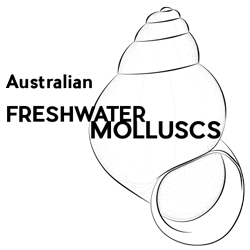
This species belongs to the Austropyrgus sparsus group, whose members are characterised by the following shell features: small to medium-sized shells, conical, with convex to slightly convex whorls. In females, the coiled oviduct is of an inverted U-shape or with two or more bends, loops or twists.
Austropyrgus macropus differs from other members of the group in the following combination of characters: shell small to medium, with convex whorls, outer lip heavily thickened and without reflection; penis pigmented on basal section only; anterior end of capsule gland blunt.
This species is not found in sympatry with any other species of Austropyrgus, although it occasionally co-occurs with the tateid Posticobia brazieri.
Austropyrgus macropus Clark, Miller & Ponder, 2003
Class Gastropoda
Infraclass Caenogastropoda
Order Littorinida
Suborder Rissoidina
Superfamily Truncatelloidea
Family Tateidae
Genus Austropyrgus Cotton, 1942
Original name: Austropyrgus macropus Clark, Miller & Ponder, 2003. In Clark, S. A., Miller, A. C. & Ponder, W. F. (2003). Revision of the snail genus Austropyrgus (Gastropoda: Hydrobiidae): A morphostatic radiation of freshwater gastropods in southeastern Australia. Records of the Australian Museum Supplement 28: 1–109.
Type locality: Eleanor River at road, 5 km SSW of Parndana, Kangaroo Island, South Australia.
In streams on water weeds, hard substrata (rocks etc.) and crawling on litter and sediment. Can be locally abundant. Assumed to feed by scraping bacteria and microalgae. Lay solitary capsules containing a single egg. Direct development.
This species is found in the small streams and rivers of Kangaroo Island and the coastal streams of the mainland around the Eyre and York Peninsulas and the Adelaide area of South Australia.
Although most species of Austropyrgus are geographically isolated and have restricted ranges, a few - such as A. macropus - have somewhat wider ranges.
Clark, S. A., Miller, A. C. & Ponder, W. F. (2003). Revision of the snail genus Austropyrgus (Gastropoda: Hydrobiidae): a morphostatic radiation of freshwater gastropods in southeastern Australia. Records of the Australian Museum 28: 1–109.